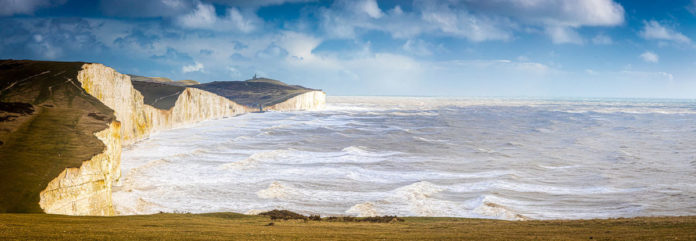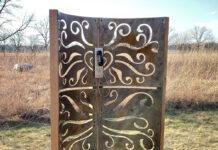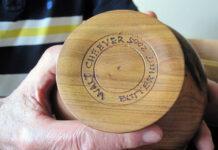For the last 33 years, Kellian Clink has been a librarian at Minnesota State University, Mankato. For the last ten years, or so, she has chosen to expand her borders by hiking every spring along the coast of England, Scotland, and Wales.
A Camino de Santiago pilgrimage — in English, The Way of St. James — with fellow Concordia alumni in the early 2000’s inspired her to seek her own hiking adventure as well as deciding traveling solo was more her style than walking in a group.
While Clink says most people think of hiking as a young person’s hobby, in England, hikers are often couples in their 70s with waterproof map cases hanging around their necks. These map cases are far from fashionable. These seniors are often dubbed Anoraks, which, according to Wikipedia is “British slang which refers to a person who has a very strong interest, perhaps obsessive, in niche subjects.” Or to put it simply, they’re viewed as being a little bit nerdy.
Hiking is a big deal in the United Kingdom!Kellian Clink
“But they are the principal hikers on the national trails and do 16 miles in a day!” Clink added.
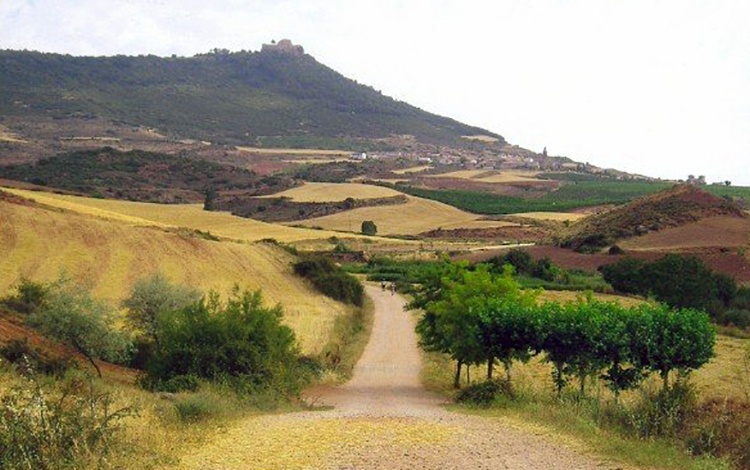
Traveling Solo
Clink isn’t hesitant to hike alone. In the first place, the trails are marked with a distinctive acorn symbol making it difficult to get lost. She also makes use of Google Earth. Before each trip she spends time looking up her route and getting an idea of what she’ll be facing on the trails. The website nationaltrail.co.uk is a big part of planning her route. “Hiking is a big deal in the United Kingdom!” she said.
There are many companies that provide a service to transport the hiker’s baggage from place to place as well as providing many other services. This way, the hiker only travels with a water bottle and a map. With thousands of miles of national trails, a number of companies have sprouted up to help. For a fee, they’ll make all the hiker’s reservations and arrangements. “And if you’re walking alone, it’s reassuring to know that in the event of a mishap, someone will be wondering where you got to that day and be looking for you,” Clink said.
Unlike the United States, where a lot of the coastal areas are in private hands, the paths where people have walked for centuries are valued and available to everyoneKellian Clink
While books and websites describe the varying trails, Clink buys the most detailed trail books and hiking maps which offer her multiple ways of checking on her location—from OS maps (Ordinance Survey – similar to Geological Survey maps in the U.S.) to the hiking book which has line drawings of benches, kissing gates, arrows indicating elevation changes, as well as where the toilets are along the hike for that day. Her phone has also proved to be a savior once when she got quite lost in Anglesey.
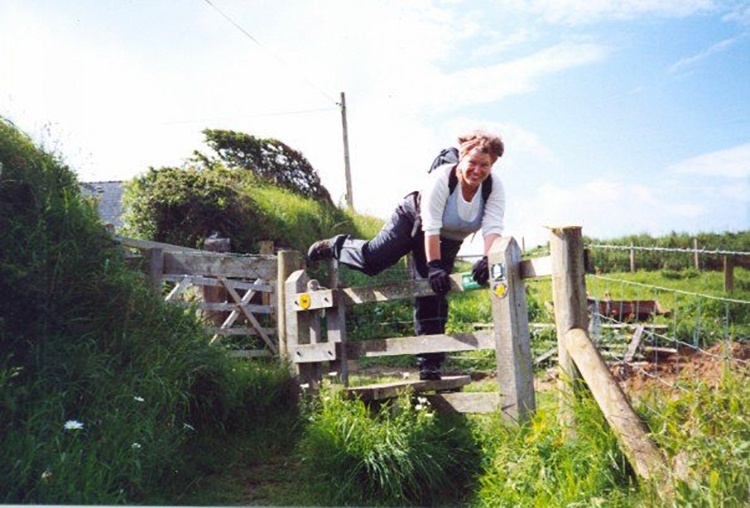
In England, paths are considered a public treasure and are sacred to the native heritage. “Unlike the United States, where a lot of the coastal areas are in private hands, the paths where people have walked for centuries are valued and available to everyone,” Clink said.
Sometimes the hiker must walk through pastures, but the paths are public thoroughfares. Hikers are warned to keep dogs on leads if there are sheep or cattle they might harry. No matter where they lead, the paths are public, held in trust for the entire nation.
Lodging
One of the delights of a British walking tour is the local lodging. Throughout her travels, Clink prefers to stay in rented rooms above pubs which allows her to socialize with the locals. When she’s in Wales, she thoroughly enjoys listening to the locals. “It’s musical,” she offered.
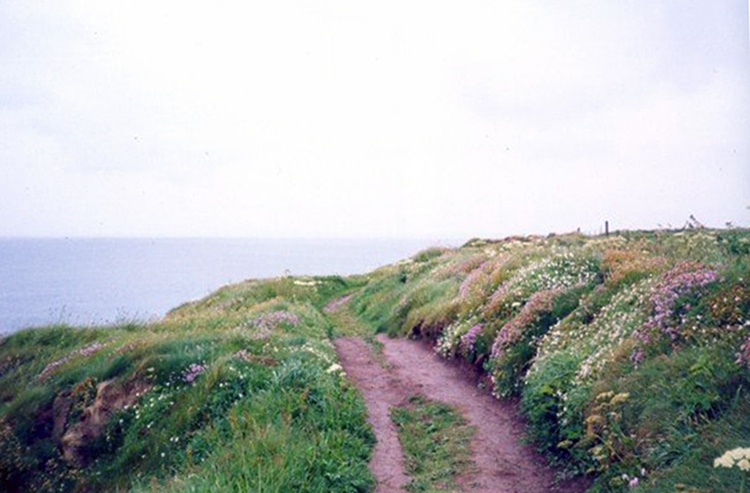
The walking trips aren’t without some challenges. One time, she started with the North Downs Way, but too many bridle paths got her muddled and she decided that the coastal path was easier. “If the ocean isn’t on the right side, you know you’re lost right away!” She said, chuckling.
Why the United Kingdom?
Among her fondest memories was the time she spotted goats hanging out on a remote cliff. Another is Durdle Door in Dorset, a rock that resembles a dragon drinking out of the water. Clink also uncovered ammonite fossils in Dorset which are now in a collection on her desk.
So why the United Kingdom?” Public access to coasts, friendly folks, sea lions, dolphins, castles, history, cathedrals. … It is all so good!Kellian Clink
One of her favorite recent experiences was in Winchester getting to see the cathedral where Jane Austen is buried and where she learned, according to a guide, that an American Jane Austen society provides fresh flowers weekly.
From Roman ruins in Chester to Tintagel in Cornwall, castles and historical churches are visible in virtually every town. Other more recent history can be seen in the effigy of T. E. Lawrence in Wareham or the Bowie exhibit at the Victoria and Albert Museum she enjoyed one year. Whether it’s Cygnets in Abbotsbury or Highclere Castle, the setting for Downtown Abbey all of England is picturesque. “It could not be more romantic!” Clink added.
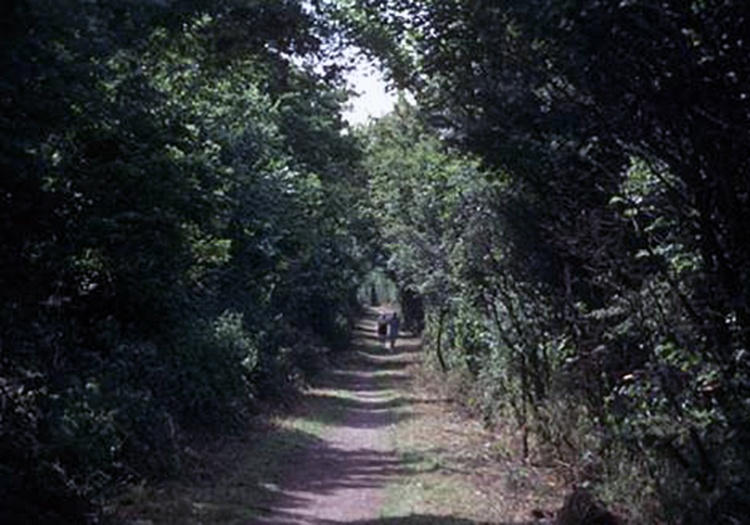
Occasionally she encountered the thrill of danger. For instance, hikers cannot cross to the Holy Island of Lindisfarne without waiting for the tide to go out over the one road connecting the island to the mainland. “And there’s quicksand to watch for!”
She had the pleasure of visiting Chester, a city in northwest England that was also a fortress in the first century, A.D. Excavations of a Roman amphitheater, continue just beyond the old city’s walls.
Her favorite part of the trip is always the visits to her friends in York who run an international organization teaching organic gardening and who often have visitors from all over Europe, and even from the United States.
“So why the United Kingdom?” Clink asks. “Public access to coasts, friendly folks, sea lions, dolphins, castles, history, cathedrals. … It is all so good!”

